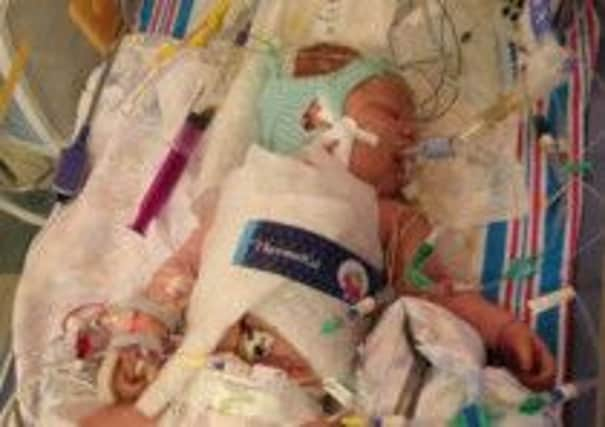Nottingham City Hospital doctor’s blunder led to Hucknall baby’s death, inquest told


In a case described by Nottinghamshire assistant coroner Heidi Connor as “unbearably sad”, Alyssa Rose Legg was “a much-wished for baby”.
Mum Karen Legg (37), of Eastwood Close, had been trying to conceive since she married husband Sion (30) nine years earlier.
Advertisement
Hide AdAdvertisement
Hide AdAlyssa was born, 10 days overdue, on Wednesday 10th July last year. But she was in such “a poor condition” that she died just a week later.
And the inquest was told that a misjudgment by a doctor at Nottingham City Hospital during Mrs Legg’s labour was probably to blame.
The doctor wrongly assessed the seriousness of results of a cardiotocography (CTG) check on the baby’s heartbeat. Instead of following guidelines and deciding Alyssa needed to be delivered immediately, he opted to delay and review later.
When another clinician, Dr Amudah Thangavelu, came on duty only 18 minutes later and examined Mrs Legg, she decided to carry out an emergency ceasarean section birth immediately.
Advertisement
Hide AdAdvertisement
Hide AdHowever, Alyssa was born “pale and floppy”, the inquest heard. “She had no heart rate and was not breathing,” said Dr Kumar Swamy, of the hospital’s neo-natal unit.
“She showed severe brain abnormality because of a lack of oxygen and blood supply and had severe acidosis.”
In recording a narrative conclusion, Mrs Connor said: “Despite the best efforts of the neo-natal team over the following week, Alyssa was too ill to withstand what had happened.
“There are no words to describe how the parents must have felt. This is viewed by the Nottingham University Hospitals Trust as an individual error, rather than an inadequacy of systems.
Advertisement
Hide AdAdvertisement
Hide Ad“Alyssa died in the late stages of her mother’s labour, which was incorrectly managed. In breach of protocol, the doctor chose to wait. With better management, it is likely that Alyssa would not have died.”
A post mortem, carried out by experienced pathologist Dr James Padfield, concluded that Alyssa died through a lack of oxygen during the birth process and also from multiple organ failure.
Both the Trust, which runs the City Hospital, and Mrs Legg, who is now pregnant again, were represented by solicitors at the inquest.
For the Trust, Amanda Wright-Kluger accepted there had been “sub-optimal care that caused a delay which led to the outcome”.
Advertisement
Hide AdAdvertisement
Hide AdSenior consultant Dr Judith Moore said it was “an isolated error” by the doctor, and stressed that steps had been taken since the tragedy “to try and reduce the impact of human error”.
Dr Moore told Mrs Legg: “This is a tragic situation, and you are very brave to go through another pregnancy.”
For the Leggs, lawyer Adam Korn said they were “grateful for the Trust’s full and candid admission of liability”. But the parents were more concerned by unanswered questions concerning the circumstances of the death.
These included the way Mrs Legg was treated when she rushed to the hospital the day before the birth on Tuesday 9th July -- when she felt certain her waters had broken.
Advertisement
Hide AdAdvertisement
Hide AdA midwife assured her this was not the case, saying Mrs Legg had “possibly wet herself”, and told her to return to the hospital the next day for the induction of her labour.
But the inquest heard that Mrs Legg felt the midwife “appeared to be in a rush and was off-hand with me”. Had she been induced there and then, “her labour might have followed a different course”, said Mr Korn.
Mr Korn said the parents were also confused by the suggestion, both in the post mortem and in an official report into the death, that Alyssa was suffering from an infection.
“This might be a red herring, but it was possibly a contributory factor,” he said.
Advertisement
Hide AdAdvertisement
Hide AdIt was particularly worrying because Mrs Legg had been identified as having Group B streptococcus, a bacteria which can cause complications for newborn babies.
However, Mrs Connor said she was “satisfied that the infection did not play a part in causing the death”, pointing to the evidence of Dr Thwamy that it was “definitely not the main problem Alyssa was struggling with”.
With regard to when Mrs Legg’s waters broke, Mrs Connor said: “I have no reason to disbelieve her but, on balance, I find it more likely that Mrs Legg’s waters broke when she was at the hospital on 10th July, not the 9th.”